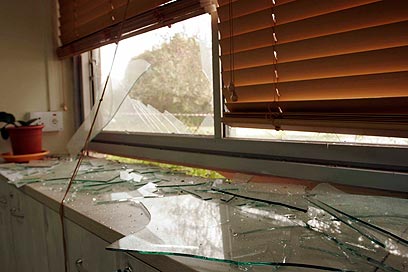
Escalation in south behind us?
As rockets continue to hit south despite Hamas ceasefire IDF reins in response awaiting developments – is escalation behind us or is this the calm before the storm?
A rocket fired Monday morning from the Gaza Strip fell near a public building in the Eshkol Regional Council. There were no injuries but the building suffered from structural damages. Additional rockets were also fired from Gaza – after reports of a Hamas sponsored ceasefire.
South under fire:
- Rockets fired despite ceasefire
- Report: Gaza groups agree on ceasefire
- Barak warns enemies to be 'decapitated'
- Watch: Jon Voight visits terror victims
- Gaza groups out to challenge Hamas?
At around 1:20 am an air raid siren roused Ashkelon residents as a rocket was fired from Gaza. The Iron Dome system intercepted the rocket with residents reporting shrapnel falling on buildings in the city. Earlier, two more rockets were fired from Gaza at southern Israel. The Qassams landed in the Sderot area, causing no injuries or damages.
If no exceptional incidents occur, it is quite possible that the escalation in the Gaza Strip and the south of Israel is behind us, but for over a million residents living in the shadow of daily rocket fire, there are no assurances.
The escalation in violence came as a result of last week's terror attack near the Egyptian border where the tension could still be felt Sunday night. IDF forces identified suspicious figures near a military base at the border and fired shots in the air. They later canvassed the area for suspects.
The defense establishment believes the IDF's activities in response to the terror attack, including a number of air strikes in the Gaza Strip, sent terror groups a strong message. In a situation when neither side is interested in escalation – it would seem that both sides were aiming for a ceasefire - Israeli representatives were in Cairo Sunday for talks on the recent escalating violence.
Defense officials told Ynet that developments would need to be examined carefully. Israel wants proof of the cessation of violence on the other side before declaring an end to the strikes. Meanwhile, officials decided to hold off on declaring a "state of emergency on the home front" in the Gaza vicinity communities, a situation that often occurred in the pre-Operation Cast Lead days. This can be seen as another step towards calm.
Throughout the day on Sunday evidence of IDF preparation for a response that would include more than just air strikes against rocket launcher cells surfaced. Meetings were held and directives were handed down. Yet even now the defense establishment admits that the situation is fragile and that "one incident is enough to bring us to a different situation".
'Superficial responses not enough'
If the calm continues on Monday the main question remains – what message did Hamas receive from recent events and what will it mean for the future. There has already been criticism from within the IDF's field ranks over the lack of response and fears that the chosen path will lead Hamas and terror organizations to expand the circle of violence.
"Superficial responses are not enough," IDF officers told Ynet. Defense officials addressed the criticism and noted: "It is easy to understand why people feel the way they do, but there is a wider scope of issues that need to be taken into consideration."
The political echelons said Sunday night that "there will be no calm on this side until there is calm on the other side. The IDF will continue its operations to eliminate the rocket launchers."
Meanwhile in Gaza, Hamas and Islamic Jihad officials may have agreed to a ceasefire but a spokesman for the Popular Resistance Committees immediately issued a statement saying the group would not accept a ceasefire agreement with Israel.
"Our stance is clear. We have no connection to the ceasefire agreement with the Zionist enemy," Abu Mujahed told a Palestinian news agency.
He said Israel had stepped up violence by assassinating members of the PRC and that it had to take responsibility for its actions. "We cannot accept a ceasefire while airstrikes continue to reverberate everywhere," Abu Mujahed said, adding that the ceasefire was "cursed".
Hanan Greenberg, Shmulik Haddad and Ilana Curiel contributed to the report
- Follow Ynetnews on Facebook












